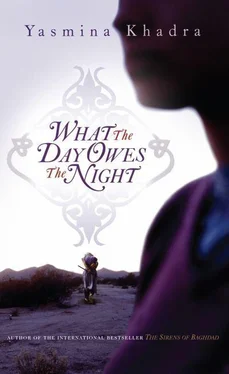André took us on a tour of his ‘revolution’. The diner was nothing like any café we had ever seen. It was painted in bright, garish colours; behind the bar was a huge mirror with a silhouette of the Golden Gate Bridge etched into the glass. There were tall upholstered bar stools, brass shelves groaning beneath the weight of bottles and curios, bright neon signs and strange gadgets. The walls were plastered with huge photographs of Hollywood stars. The shutters were closed and the curtains drawn, so the ceiling lights gave off a warm muted glow while wall sconces cast blood-red shadows all around. The seats, bolted to the floor, were arranged in booths like the seats of a train around rectangular tables on which were scenes of the American Wild West.
In the next room, a pool table took pride of place. No café in Río Salado or Lourmel had a pool table. The one André had imported for his guests was a work of art, beautifully lit by a hanging lamp that all but touched the table.
Picking up a pool cue, André chalked the tip, then leaned over the table and lined up his shot using his knuckles as a rest. The rack of coloured balls exploded across the table, ricocheting off the cushions.
‘From now on,’ he declared, ‘people here won’t go to a bar to get drunk. At my place, they’ll come to play pool. And this is only stage one. I’ve got three more tables on order, which should be here by the end of the month. I’m planning to set up a regional tournament.’
José appeared with beers for the others and a soft drink for me, and suggested we go take a table on the terrace until the other guests arrived. It was about seven p.m. The sun was slipping slowly behind the hills, shooting its last glimmers through the vineyards. From the terrace, we had a perfect view of the surrounding plains and the road that wound its way to Lourmel. A bus dropped passengers just outside the village: people from Río Salado on their way back from Oran, and Arab labourers coming in from the building sites in the city. The labourers, clearly exhausted, cut across the fields with bundles under their arms, heading for the dirt track that led to their village of squalid shacks.
Jelloul watched me watching them, and as the last labourer disappeared around a bend in the dirt track, he turned and shot me an unsettling glance.
As the sun sank behind the hills, the Rucillio clan rolled up – Pépé’s two youngest sons, some of their cousins and their brother-in-law, Antonio, who worked as a cabaret singer in Sidi Bel-Abbès – in a spanking new Citroën straight from the factory, which they parked near the entrance where everyone could see it.
André greeted them all with the back-slapping good humour of the rich, and then escorted them to the best seats.
‘You can be rolling in it and still smell horse shit for miles around,’ complained Simon, piqued that the Rucillio family had walked past without so much as a nod to us.
‘You know what they’re like,’ I said.
‘I don’t care – they could at least have said hello. We’re hardly the dregs of society: you’re a chemist, Fabrice is a poet and a journalist, I’m a civil servant.’
It was not quite dark as the terrace began to fill with beautiful girls and young men dressed to the nines. Older couples arrived in gleaming cars, the ladies in evening gowns, their escorts wearing suits and bow ties. André had invited the cream of Río Salado society and every notable family for miles around. In the crowd we could make out the son of the richest man in Hammam Bouhadjar. His father owned a private plane and on his arm was one of Oran’s rising singing stars, who was surrounded by eager fans showering her with compliments, eager to light her cigarette.
Chinese lanterns were lit and floated above the terrace. José clapped his hands for silence and the noise died away. André went up on to the stage and thanked his guests for coming to celebrate the opening of his diner. He began with a crude joke that made his guests, who were more used to refinement, somewhat uncomfortable, then, deploring the fact that his audience was not broad-minded enough to let him continue in a similar vein, he cut short his speech and left the stage to the musicians.
The evening began with music the like of which no one in Río Salado had ever heard, all trumpets and a double bass. The audience were left cold.
‘It’s jazz, for God’s sake!’ André cursed them. ‘How can anyone not like jazz?’
The jazz band began to realise that if Río Salado was only sixty miles from Oran, its musical taste was a million miles away. Being professionals, they continued to play for a while, then, as an encore, they played something that sounded like a curse. The crowd barely noticed when they finally left the stage.
Though André had anticipated that this might happen, he had at least expected his guests to treat the finest jazz band in Algeria with some respect. We watched his grovelling apology to the furious trumpeter, who seemed to be saying that he would never again set foot in this godforsaken, culturally benighted hole.
As André and the bandleader argued, José introduced a second band – a group of locals this time. From the moment they took the stage, the whole audience heaved a sigh of relief, and the floor was suddenly filled with people dancing and swaying.
Fabrice Scamaroni invited the mayor’s niece to dance and eagerly led her on to the floor. I asked a shy girl, who politely refused me, though I managed to convince her friend to take the floor. Simon did not dance, but sat in some strange state of rapture, his plump, childish face in his hands, gazing at what seemed to be an empty table at the far end of the terrace.
When the musicians took a break, I walked my dancing partner back to her seat, then went back out to where Simon, oblivious of my presence, sat smiling vaguely, still staring into the distance. I waved a hand in front of his eyes but he didn’t react. I followed his gaze and I saw . . . her.
She was sitting alone at a table that had been hastily added and so had no tablecloth or napkins. I glimpsed her as she appeared and disappeared between the swaying dancers. Suddenly I knew why Simon – who could usually be relied on to turn any social event into a circus – seemed so serene. The mere sight of this girl had left him speechless.
She was wearing a pale, figure-hugging dress and elbow-length gloves; her black hair was pulled up into a chignon. With a smile as delicate as a wisp of smoke, she gazed out at the dancers without seeing them, her chin perched on her gloved fingertips, absorbed in her own thoughts. From time to time she vanished behind the shadows that whirled about her, only to re-emerge like a nymph appearing from a lake.
‘Isn’t she beautiful?’ Simon gasped.
‘She’s magnificent.’
‘Just look at those eyes. I’ll bet they are as black as her hair. And her nose! Her nose, it’s perfect . . .’
‘Easy does it.’
‘And her lips, Jonas, have you seen her tiny rosebud lips? How does she manage to eat?’
‘Hey, Simon, come back down to earth!’
‘What would I want to do that for?’
‘Because it’s a long drop from that cloud of yours.’
‘I don’t care . . . For a beauty like that, I’m happy to take a tumble.’
‘And how exactly do you plan to win her over?’
At length he looked at me, and I saw a sad smile steal over his face.
‘You know perfectly well I’ve got no chance,’ he said. The sudden change of tone was heartbreaking, but he soon rallied. ‘Do you think she’s from Río Salado?’
‘I don’t think so. We would have seen her before now.’
‘You’re right.’ Simon smiled. ‘I could never have forgotten a face like that.’
We both held our breath as we watched a young man saunter over to the girl and ask her to dance, then both of us let it out in a sigh of relief when she politely declined.
Читать дальше












